Demographics and the Immigration Imperative
Reading Time: 9 minutes, 18 seconds"Demography is destiny." This sentence is commonly attributed to the French philosopher August Comte, who many consider to be the father of sociology. He probably never actually said this, but it is, at least, a succinct summation of his argument that the future of a nation's people depends largely on its ability to produce young people. Countries that do so can grow and expand their wealth and influence. Countries that do not will shrink, and culturally collapse into themselves.
This argument is, in many ways, a theory that's based in the ideas and social context of the 19th century. Some of Comte's arguments need to be taken with a grain of salt. But that doesn't mean that demographics isn't a relevant or powerful predictor of political and social trends.
In fact, demographics is an important element to the current issue of immigration in Western countries for a very important reason, which I'll get to later. For now, we need to talk about Western demographics themselves, in order to understand the immigration policies we'll discuss in the latter half of this article.
Let's take a look at some demographics in selected countries. To do this, we'll use the extremely useful Population Pyramid website. We'll start with Nigeria.

This is what would be considered a "healthy" or "normal" population pyramid. And, yes, those scare quotes are intentional. It might be considered a bit too "healthy", considering the population growth such a pyramid implies. It also implies future issues related to housing, land usage, resource usage, etc. If you dislike population growth for environmental reasons, this doesn't look healthy, it looks downright scary.
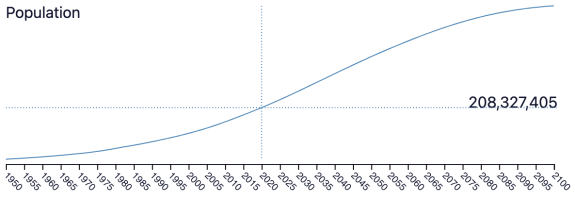
If present trends continue, Nigeria will have a population of 546 million people by 2100. And, what is true for Nigeria is true for Africa in general.

Similarly, population growth in Africa is predicted to grow to 3.9 billion people by 2100.
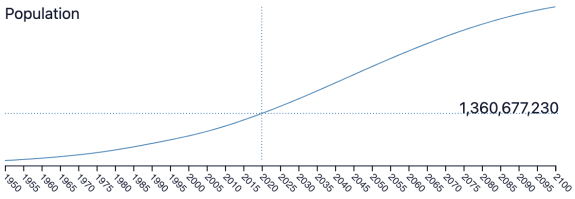
One could (and many do) make the argument that such population growth is unsustainable. Moreover, it assumes that current trends will continue, which, of course, they may not. The general experience in population growth worldwide has been that as societies get richer, population growth begins to decline, usually precipitously. As Peter Zeihan sometimes cynically puts it, when you live in a poor rural country, children are free labor. When you live in a wealthy urban society, kids are expensive hobbies.
So, as African nations grow more wealthy, we can expect these demographics to begin changing, just as they have in Western countries. In fact, even outside the West, we see it. Take China, for instance.

This is not a healthy population pyramid at first glance. Older people already outnumber younger people. But, wait, it gets worse. Look at the balance between males and females. Because of the one-child policy, the Chinese tended to abort girls during pregnancy. So, men significantly outnumber women in every age cohort under 30 years of age. This imbalance implies the inversion of the population pyramid will continue for quite a while. Serious population decline is pretty much unavoidable for China.
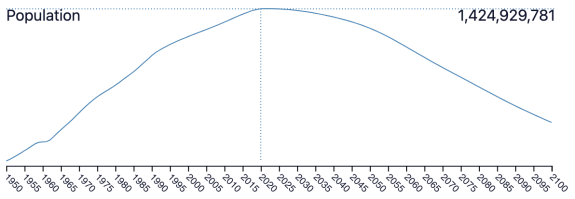
And by "serious", we're talking about the population of China falling by half, sometime prior to 2100.
As we move into the West, we see something very similar. For instance, here's the population pyramid for Germany.

Population growth in Germany is headed for a steep decline.
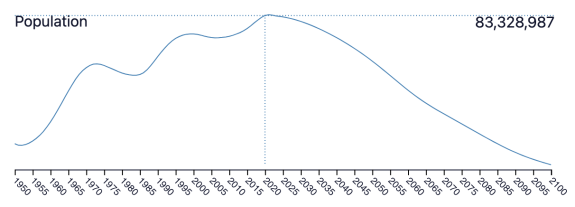
While Germany is one of the worst examples of inevitable decline in population, Western Europe as a whole isn't much better.

And, again, while not as bad as Germany, population in Western Europe is still en route to decline over the next 80 years.
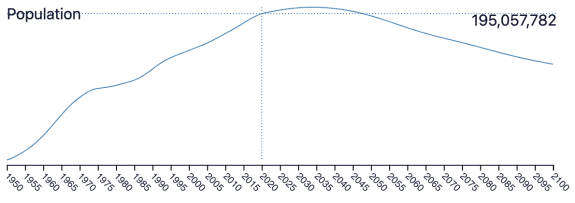
Some Western countries, like the US, fall into a weird middle category.

While the population of the US isn't set to decline, it is set to stabilize. Or, as some might say, stagnate.
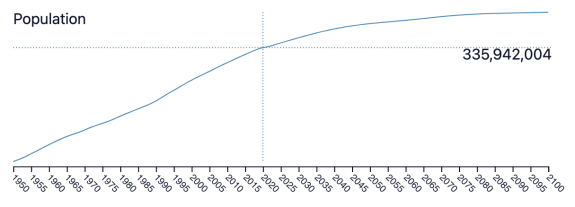
So, there are some key takeaways I want to point out before I begin discussing immigration in the West.
Affluent countries are no longer reproducing at a replacement rate. Each generation of parents needs to produce about 2.4 children to replace themselves, just to keep the population stable. Most western populations are having children at a rate below replacement. Some, as in the case of Germany, are far below the replacement rate.
The lack of children means that, over the next 30 years, most Western countries are going to have more retirees than they have workers. These retirees are going to need expensive pensions, medical care, and housing, with fewer and fewer workers to provide it.
Of course, this all, again, based on the assumption that current trends continue. They might not. Some major social change may occur that prompts people in the West to begin having larger families again. But, current social and economic trends would seem to make that difficult. For example, as a matter of simple economics, it's become increasingly difficult to support a household on a single income. Both prospective parents in a household must work to keep treading water, economically. Two-income families tend to have less time and economic room for children.
But even if these current trends do change, the change will take decades to have any real effect. Even if everybody in the West started to have children tomorrow, it'd be at least 20 years before the first of those children started to enter the workforce.
The Ponzi Scheme
Policymakers in Western Nations bought into a shared set of policies, starting in the 1930s, which they expanded radically after World War II. Especially in Europe, the dominant political praxis became to create a ubiquitous welfare state that used relatively high taxes to provide expansive social services for the population. The United States lagged, and still lags, behind Europe in this regard, but still provides things like welfare programs of various kinds for the poor like Medicaid, and especially the Social Security and Medicare programs for the elderly. For European countries, a social welfare net exists from nearly cradle to grave, in an attempt to shelter their whole society from almost any sort of misfortune.
European countries tax income far more heavily than the United States, and have far more regressive tax regimes. On average, European income taxes are levied at rates from 40-60%, and do not provide the sort of extensive set of tax deductions one finds in the American tax system. In Europe, the rate of real income tax is practically synonymous with the marginal rate. Even low-wage workers are obligated to pay 40% or so of their income in taxes, which are generally simply withheld from their paychecks. In addition, most European countries also levy an additional value-added tax of around 20% or higher on everything you buy, other than non-prepared foods or clothing.
The American tax system is more complicated, because each state has their own taxation schemes that are applied in addition to the Federal income tax. Most states, however, do have an income tax that can he as high as 9.8% in California. States like Texas, which has no income tax, tend to have property tax rates that a Californian would find outrageous. The states are going to get their money, one way or another, but, at least state income taxes are deductible from Federal income taxes. In general, American citizens are taxed far less heavily than their European counterparts, though America also has a far less extensive set of social services.
But, irrespective of the tax regime or ubiquity of social services, Western countries do share exactly the same politico-economic calculation when it comes to their social services:
- Social services are paid through taxes.
- Social Services for the elderly are, by far, the most expensive element.
- Productive workers are the only people with income that can be taxed, since retirees don't work.
- There must be enough productive workers to pay the taxes required to keep the system functioning, without tax rates becoming unacceptably confiscatory.
Social Services are, at their heart, Ponzi schemes. A Ponzi scheme can only succeed as long as there are new investors. If the influx of new investors dries up, the Ponzi scheme ends, and the most recent investors are left with nothing, and the returns come to a stop for all the original investors as well. Those who got into the scheme first may have made money, but everyone else is left with nothing.
Similarly, government social services depend on a new cohort of workers to enter the workforce every year, in order to provide the tax money that pays for social welfare. If the spigot of new workers gets turned off, there's no one to pay taxes, and the whole system collapses.
So, As I said, Western policymakers know the demographic trends they're facing quite well. They can see that the spigot of new workers from the native population is turning off. They also know that turning those trends around, even if possible, would be both difficult and time-consuming, since demographics, and the economic challenges that arise from them, are impossible to solve overnight.
Unless...
The immigration Imperative
And, thus, finally, we arrive at immigration.
Now, there's a theory that's going around that politicians, in league with Klaus Schwab and the WEF, have been captured by Marxist ideology. So, they're supporting massive immigration in the West, in order to destroy the Western nations and their national characters by replacing them with 3rd World immigrants who'll undermine their host nation's values. This, the theory goes, is all designed to collapse the West in preparation to creating a world-wide government. That government will usher in some sort of feudal communism (if that's not a contradiction in terms). In the end, the mass of the world's population will labor to provide the rents that fuel the fantastically wealthy lifestyle of an elite nomeklatura, which will consist of government officials and their friends.
The thing is, whether that's true or not, we don't need such an elaborate explanation for the widespread support for immigration among Western policymakers. All we have to do is look at the demographics. Indeed, if you listen carefully, Western politicians will tell you.
On 23 November 2023, an immigrant in Ireland stabbed a teacher and three young children outside a school. By that evening, protests in Dublin had turned to rioting. (Interestingly, the attack was stopped by another immigrant, Caio Benicio, from Brazil, who saw the attack and beat the assailant senseless with a motorcycle helmet.)
In response to the rioting, Irish Prime Minister Leo Varadkar said:
Ireland is a country of migrants. Our public services wouldn’t operate without migration. There’d be nobody to look after the sick or to care for the old, certainly not enough people.
Let's leave aside the assertion that Ireland is a country of migrants. (Historically, Ireland has been a country of emigrants rather than immigrants.) It's the last bit that's important. It's an acknowledgement that, even Ireland, with far more favorable demographics than most European countries, needs immigrants to keep its social welfare system going.
Facing the current demographic trends in the West, there are a very limited number of options for addressing the welfare states that have been built since 1945.
- Do nothing.
- Reform the system.
- Massively increase the rate of taxation.
- Substantially increase immigration.
The first three solutions are non-starters.
If you do nothing, your welfare system will collapse either because a) the money runs out and programs can't be funded, or b) you finance with debt until you can't borrow anymore, after which the currency collapses, and your welfare system collapses anyway. People have made life-long decisions about saving and investing based on both the promises politicians made to them about the benefits they'll receive, and the tax regime that's been forced on them. Retirees will be vengeful because their benefits will cease and many will be left on poverty. Workers will be vengeful because they've been taxed for benefits they'll never receive. They'll end up in poverty after retirement, too, because money this otherwise have been saved has been taxed away.
Reforming those systems isn't a much better choice for policymakers. Almost universally, policy suggestions to reform Western social welfare systems are political death to those who advocate them. In the US, for example, mentioning that Social Security might need to be reformed is a straight highway to TV commercials depicting you wheeling Grandma off a cliff in a wheelchair. Voters who've been promised a set of social benefits for generations tend to react very negatively to any suggestion that those benefits be curtailed.
Massively increasing the rate of taxation won't work either. People don't work because they get such fundamental joy out of it. People produce to consume. They work because they want to buy houses, and cars, and TVs. This is especially true in European countries like Denmark or the Netherlands, where the average worker already pays 50% of their income in taxes. Any substantially higher rates of taxation will make working economically inviable to the average worker. People will require even more services from the government, just to keep a roof over their head. You certainly won't increase the labor pool by taxing workers more and more, you'll just get fewer workers.
In the minds of Western policymakers, immigration is the only practical solution for demographic crisis. If they can pull in enough immigrant workers, the social welfare system can continue unchanged. Hard choices can then be avoided.
Of course, there are other incentives for politicians to increase immigration. Businesses want immigration because immigrants tend to work for lower wages, thus labor costs can be constrained. Marxists, do, in fact, want immigration to the West, to use as a tool for reducing societal cohesion in order to force ideological and cultural changes on society, as I've addressed elsewhere. Pro-immigration groups of various stripes try to use whatever leverage they have to support pro-immigration politicians.
The bottom line, however, is that, in many ways, August Comte was right. Demographics is destiny. In the West, our current demographic trends make immigration look like a very attractive solution to policymakers.